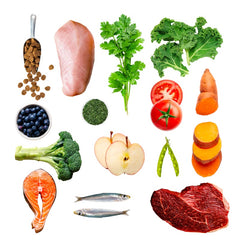
In this article, we will delve into the importance of diet and nutrition in managing diabetes in dogs. Having had first hand experience with a diabetic dog, we have put together valuable tips and insights to help guide you in making the best dietary choices for your diabetic canine companion. From understanding the right types of carbohydrates to incorporating high-quality proteins and healthy fats, we will provide you with all the essential information you need to keep your dog healthy and happy.
Managing diabetes in dogs can be a daunting task, but with the right knowledge and resources, you can ensure that your furry friend leads a fulfilling life. So, let's dive into the world of canine nutrition and learn how to effectively manage diabetes through diet and nutrition.
Understanding diabetes in dogs
Diabetes is a chronic condition that affects dogs, just like it does humans. It occurs when the dog's body is unable to produce enough insulin or effectively use the insulin it does produce. Insulin is a hormone that helps regulate the levels of glucose (sugar) in the bloodstream. Without proper insulin function, glucose builds up in the blood, leading to high blood sugar levels.
There are two types of diabetes that commonly affect dogs: type 1 diabetes and type 2 diabetes. Type 1 diabetes is an autoimmune disease where the dog's immune system mistakenly attacks the cells in the pancreas that produce insulin. Type 2 diabetes, on the other hand, is more commonly seen in overweight or obese dogs and is characterized by insulin resistance.
The role of diet and nutrition in managing diabetes
 When it comes to managing diabetes in dogs, diet and nutrition are crucial. A well-balanced, carefully planned diet can help regulate blood sugar levels and ensure that your dog is getting the necessary nutrients to maintain optimal health. The ultimate goal is to keep your dog's blood sugar levels stable throughout the day and prevent any spikes or drops that can lead to complications.
When it comes to managing diabetes in dogs, diet and nutrition are crucial. A well-balanced, carefully planned diet can help regulate blood sugar levels and ensure that your dog is getting the necessary nutrients to maintain optimal health. The ultimate goal is to keep your dog's blood sugar levels stable throughout the day and prevent any spikes or drops that can lead to complications.
One of the key aspects of a diabetic dog's diet is controlling the intake of carbohydrates. Carbohydrates are broken down into glucose during digestion and have the most significant impact on blood sugar levels. It's essential to choose carbohydrates that have a low glycemic index (GI) as they are digested and absorbed more slowly, resulting in a slower and steadier rise in blood sugar levels. High-fiber carbohydrates, such as sweet potatoes and brown rice, are excellent choices for diabetic dogs as they provide sustained energy and help regulate blood sugar.
Key nutrients for diabetic dogs
In addition to controlling carbohydrates, diabetic dogs require a diet that is rich in essential nutrients. Proteins play a vital role in a diabetic dog's diet as they help regulate blood sugar levels and provide necessary amino acids for overall health. Opt for high-quality, lean proteins such as chicken, turkey, and fish. These protein sources are not only low in fat but also provide essential vitamins and minerals.
Healthy fats are another essential component of a diabetic dog's diet. While fats should be limited to prevent weight gain, incorporating small amounts of healthy fats can provide necessary omega-3 fatty acids, which have anti-inflammatory properties and support overall health. Sources of healthy fats include fish oil, flaxseed oil, and coconut oil.
It's also crucial to include a variety of fruits and vegetables in your diabetic dog's diet. These provide essential vitamins, minerals, and antioxidants. However, it's important to avoid fruits and vegetables that are high in sugar, such as grapes and raisins, as they can cause a sudden increase in blood sugar levels.
Common mistakes to avoid in diabetic dog diets
When managing diabetes in dogs, there are several common mistakes that pet owners should avoid. One of the most significant mistakes is feeding the wrong types of carbohydrates. Simple carbohydrates, such as white rice and refined grains, should be avoided as they are quickly digested and can cause a rapid increase in blood sugar levels. Instead, focus on complex carbohydrates with a low glycemic index, as mentioned earlier.
Another mistake is overfeeding. It's crucial to establish a feeding schedule and portion control to prevent overeating and weight gain. Consistency is key, as irregular feeding times can lead to fluctuations in blood sugar levels. Work with your veterinarian to determine the appropriate portion sizes for your dog based on their weight, age, and activity level.
Avoid feeding your diabetic dog table scraps or treats that are high in sugar. Even small amounts of sugary foods can cause a significant increase in blood sugar levels. Opt for diabetic-friendly treats or consider using low-sugar vegetables, such as carrots or green beans, as rewards.
Expert tips for managing diabetes through diet and nutrition
Here are some expert tips to help you effectively manage diabetes in your dog through diet and nutrition:
1. Consult with your veterinarian: It's essential to work closely with your veterinarian to create a personalised diet plan for your diabetic dog. They can provide guidance on appropriate food choices, portion sizes, and feeding schedules.
2. Monitor blood sugar levels: Regularly monitor your dog's blood sugar levels to ensure they are within the target range. This will help you assess the effectiveness of their diet and make any necessary adjustments.
3. Regular exercise: Along with a proper diet, regular exercise is essential for managing diabetes in dogs. Exercise helps improve insulin sensitivity and can contribute to weight loss, which is beneficial for overweight or obese diabetic dogs.
4. Be patient and consistent: Managing diabetes in dogs is a long-term commitment. It may take time to find the right diet and routine that works best for your dog. Stay patient, be consistent, and monitor their progress regularly.
Feeding schedule and portion control for diabetic dogs
Establishing a feeding schedule and portion control is crucial for managing diabetes in dogs. Consistency is key, so try to feed your dog at the same times each day. Divide their daily food allowance into multiple small meals to prevent blood sugar spikes.
The portion size will depend on your dog's weight, age, and activity level. Your veterinarian can provide specific guidelines based on your dog's individual needs. It's important to measure their food accurately to avoid overfeeding.
To calculate the appropriate portion size, consider your dog's ideal weight rather than their current weight. If your dog needs to lose weight, your veterinarian may recommend a lower calorie diet to help them reach their target weight gradually.
The impact of diet and nutrition on diabetes management in dogs
Diet and nutrition play a crucial role in managing diabetes in dogs. A well-balanced diet that is rich in essential nutrients, controlled in carbohydrates, and portioned appropriately can help regulate blood sugar levels and ensure your diabetic dog leads a healthy and fulfilling life.
By understanding the right types of carbohydrates, incorporating high-quality proteins and healthy fats, and avoiding common mistakes, you can effectively manage your dog's diabetes through diet and nutrition. Remember to work closely with your veterinarian, monitor your dog's blood sugar levels, and stay patient and consistent in your approach.
With the right knowledge and resources, you can provide your diabetic canine companion with a diet that supports their overall health and keeps their blood sugar in check. Your furry friend will thank you with wagging tails and a happy, healthy life.
©deliveryhound.com.au 2023






